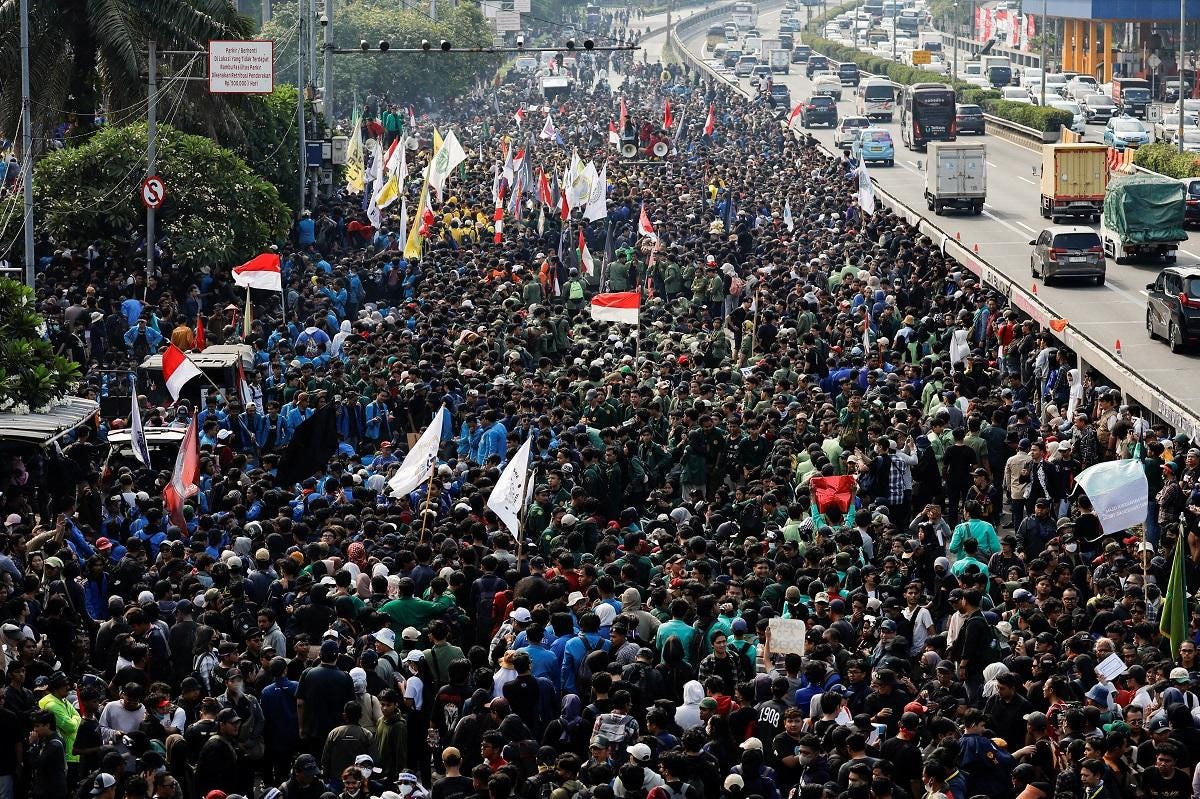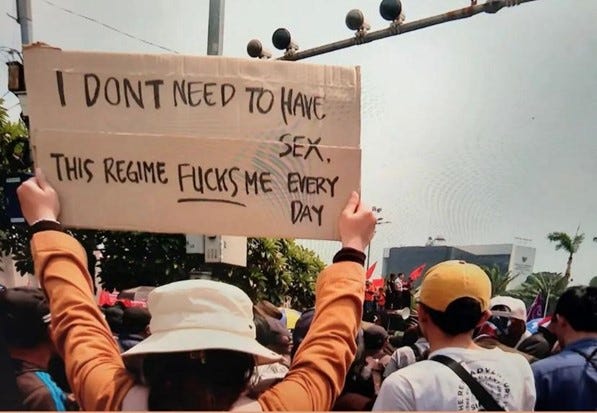Public Protest Reins in Indonesian President Jokowi’s Post-Reign Plans
President’s reputation takes a surprising succession of bruises
By: Ainur Rohmah
Indonesian President Joko Widodo is finishing his term with a sustained flurry of political machinations that include taking over Golkar, the nation's second largest party, and trying to make it impossible for any significant opposition to emerge to blunt the power of incoming President Prabowo Subianto's alliance with his soon-to-be predecessor as well as eliminating members of arch-foe Megawati Sukarnoputri’s Indonesian Democratic Party of Struggle (PDI-P) from the cabinet.
But he may have gone too far when his allies in the legislature tried to use a law to reverse a Constitutional Court ruling that would have derailed a plan to have his inexperienced youngest son Kaesang Pangarep run for the post of Central Java governor. At 29, Kaesang is a culinary entrepreneur and YouTuber with no prior governmental experience who gained attention last September when he was appointed chairman of the Indonesian Solidarity Party (PSI) after being a member for only three days.
Jokowi’s plan blew up, at least for now, in a flurry of protests by thousands and dire warnings on social media platforms that he is trying to form a dynasty and rewrite the rules to benefit himself, a steep reversal of the esteem that the president, who leaves office on October 20, built for himself after a decade in office, preceded by a term as a reformist Jakarta governor that gave him rock star status. It remains to be seen how the series of defeats will affect Jokowi’s efforts to remain a political powerhouse beyond the end of his presidency.
The House of Representatives canceled the ratification of the law designed to aid Kaesang after the plenary session scheduled for its approval was postponed due to a convenient lack of quorum, ending an extraordinary confrontation with the judiciary. Deputy Speaker Sufmi Dasco Ahmad confirmed that the ratification was called off and that the Constitutional Court's decision on regional elections would remain in effect. In response to online criticism and calls for protests, Jokowi expressed his respect for the country's institutions later that day.
Despite this, the public remains cautious about potential future political intrigues that could undermine the current legal framework. On Thursday, protests erupted in several major Indonesian cities as dissenters denounced attempts by both the president and the House of Representatives to undermine the rule of law and democratic principles. Critics argue that Jokowi, having already maneuvered his eldest son Gibran Rakabuming into the vice presidency thanks to a constitutional court ruling orchestrated by his own brother-in-law Anwar Usman, who ended up being sacked, is now attempting to advance Kaesang.
Demonstrators including artists academics, students, and civil society members gathered Thursday in front of parliament buildings in major Indonesian cities such as Jakarta, Semarang, and Bandung. They displayed posters with slogans such as “Stop destroying democracy,” “The voice of the House of Representatives is the voice of the people, not Jokowi’s voice,” and “The people want work to be subject to an age limit, but the rules are arbitrarily revised for the children of those in power.” During the protests, artist and film actor Reza Rahardian emphasized that Indonesia does not belong to any single family and called on the House of Representatives (DPR) to fulfill its role as a representative of the people rather than advancing the interests of a particular group.
Calls for demonstrations proliferated on social media following reports that the House planned to pass the law suspected of facilitating Kaesang’s bid. That rekindled public concern reminiscent of the controversy surrounding Gibran and awakened public memories of the 31-year run of nepotism and corruption that characterized the New Order reign of the strongman Suharto that ended in 1998. The situation has intensified scrutiny of Jokowi’s administration and its potential influence on electoral processes.
Amid the controversy surrounding the revision of the regional election law, Kaesang and his wife, Erina Gudono, were reported to be traveling in the United States. Erina showcased their opulent travel experience on her personal Instagram, which sparked heated debates on the X platform. It was noted that the couple traveled by private jet and purchased a loaf of bread for Rp400,000 (US$25.78) at Grand Central Market in Los Angeles, a move perceived as insensitive given the economic difficulties facing many Indonesians. Social media users criticized their apparent detachment from domestic issues, with one X user remarking, "While the couple @kaesang is enjoying bread for Rp400,000, the people are struggling because of you. Only God knows what I wish for you both.”
Constitutional law expert Zainal Arifin Mochtar from Gadjah Mada University (UGM) called the public's anger, expressed through the demonstrations, a clear message to those who might attempt to circumvent the law. He warned, “Do not deceive the public twice, as you did in the presidential election. Do not repeat it in the regional head elections.” His comments underscored widespread concerns about potential abuses of power and the need for transparency and fairness in the electoral process.
The demonstration was the culmination of widespread frustration with perceived manipulations by political elites seen as undermining the rule of law and democracy. On Monday, Jokowi delivered an unusual last-minute restructure of his cabinet, appointing new ministers closely allied with Prabowo in an effort to ensure a smoother transition of power, replacing two members of the PDI-P, reportedly because he was unhappy about the PDI-P’s July decision to extend the terms of the current membership of its central executive board to 2025 and to bring in new members that had previously criticized Jokowi.
Additionally, a coalition of government-supporting parties endorsed a single candidate for the Jakarta governor position, effectively marginalizing government critic Anies Baswedan. These moves were viewed as attempts to consolidate power and sideline opposition voices, fueling public discontent and sparking the protests. On Tuesday, the Constitutional Court decided to lower the threshold for parties to nominate candidates in regional elections, which potentially allows Anies to run.
On Wednesday, Golkar, the second-largest political party in Indonesia, elected Bahlil Lahadalia, the Minister of Energy and Mineral Resources and a key Jokowi ally, as its new chairman following the abrupt resignation of the previous leader, Airlangga Hartarto. Shortly after taking office, Bahlil warned Golkar cadres against challenging the figure he referred to as the "King of Java," a term many suspect is directed at Jokowi, though he did not specify. Airlangga, who also now serves as Coordinating Minister for the Economy, resigned amid allegations of involvement in a corruption case, suggesting possible intervention by Jokowi.
Political observer Firman Noor from the National Research and Innovation Agency (BRIN) has indicated that if the revised Regional Election Law had been approved by the House, it would have reshaped regional election nominations to favor the interests of the elites within the large coalition. Parties not included in the coalition, such as the Democratic Party of Struggle (PDIP), may face obstacles in nominating their own candidates, particularly in Jakarta Province.
The ratification of the revised law would also have significantly affected Anies in his bid to return to the Jakarta governorship, ruling out his bid due to the withdrawal of support from parties like PKS and Nasdem that previously backed him. Firman Noor argued that the core issue extends beyond the sidelining of PDIP or Anies to deprive the public of meaningful choices that reflect their aspirations, thereby undermining democratic representation and electoral fairness. The demonstrations appeared to have had an impact.



